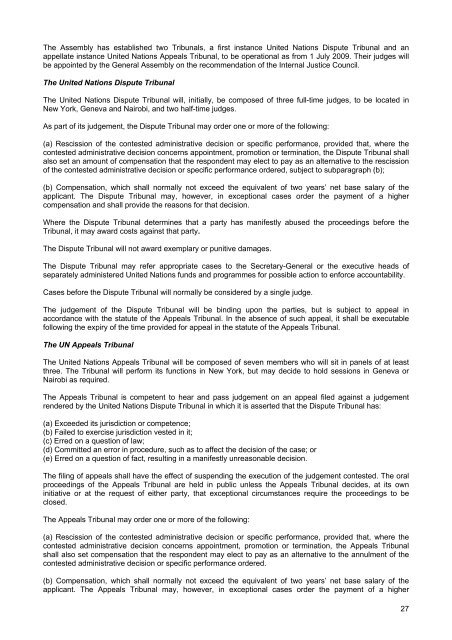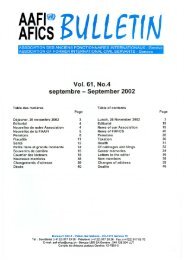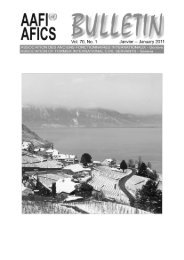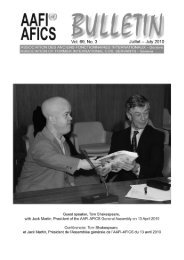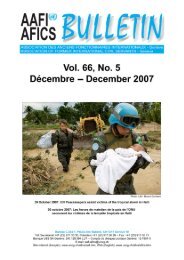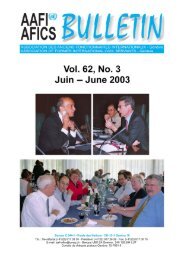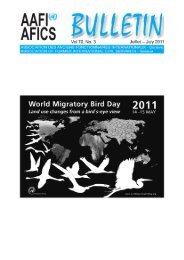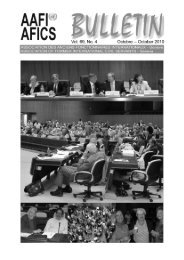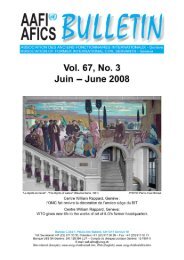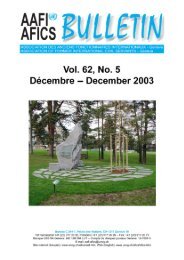VOL. 68, NO. 2 - AAFI-AFICS, Geneva - UNOG
VOL. 68, NO. 2 - AAFI-AFICS, Geneva - UNOG
VOL. 68, NO. 2 - AAFI-AFICS, Geneva - UNOG
Create successful ePaper yourself
Turn your PDF publications into a flip-book with our unique Google optimized e-Paper software.
The Assembly has established two Tribunals, a first instance United Nations Dispute Tribunal and an<br />
appellate instance United Nations Appeals Tribunal, to be operational as from 1 July 2009. Their judges will<br />
be appointed by the General Assembly on the recommendation of the Internal Justice Council.<br />
The United Nations Dispute Tribunal<br />
The United Nations Dispute Tribunal will, initially, be composed of three full-time judges, to be located in<br />
New York, <strong>Geneva</strong> and Nairobi, and two half-time judges.<br />
As part of its judgement, the Dispute Tribunal may order one or more of the following:<br />
(a) Rescission of the contested administrative decision or specific performance, provided that, where the<br />
contested administrative decision concerns appointment, promotion or termination, the Dispute Tribunal shall<br />
also set an amount of compensation that the respondent may elect to pay as an alternative to the rescission<br />
of the contested administrative decision or specific performance ordered, subject to subparagraph (b);<br />
(b) Compensation, which shall normally not exceed the equivalent of two years’ net base salary of the<br />
applicant. The Dispute Tribunal may, however, in exceptional cases order the payment of a higher<br />
compensation and shall provide the reasons for that decision.<br />
Where the Dispute Tribunal determines that a party has manifestly abused the proceedings before the<br />
Tribunal, it may award costs against that party.<br />
The Dispute Tribunal will not award exemplary or punitive damages.<br />
The Dispute Tribunal may refer appropriate cases to the Secretary-General or the executive heads of<br />
separately administered United Nations funds and programmes for possible action to enforce accountability.<br />
Cases before the Dispute Tribunal will normally be considered by a single judge.<br />
The judgement of the Dispute Tribunal will be binding upon the parties, but is subject to appeal in<br />
accordance with the statute of the Appeals Tribunal. In the absence of such appeal, it shall be executable<br />
following the expiry of the time provided for appeal in the statute of the Appeals Tribunal.<br />
The UN Appeals Tribunal<br />
The United Nations Appeals Tribunal will be composed of seven members who will sit in panels of at least<br />
three. The Tribunal will perform its functions in New York, but may decide to hold sessions in <strong>Geneva</strong> or<br />
Nairobi as required.<br />
The Appeals Tribunal is competent to hear and pass judgement on an appeal filed against a judgement<br />
rendered by the United Nations Dispute Tribunal in which it is asserted that the Dispute Tribunal has:<br />
(a) Exceeded its jurisdiction or competence;<br />
(b) Failed to exercise jurisdiction vested in it;<br />
(c) Erred on a question of law;<br />
(d) Committed an error in procedure, such as to affect the decision of the case; or<br />
(e) Erred on a question of fact, resulting in a manifestly unreasonable decision.<br />
The filing of appeals shall have the effect of suspending the execution of the judgement contested. The oral<br />
proceedings of the Appeals Tribunal are held in public unless the Appeals Tribunal decides, at its own<br />
initiative or at the request of either party, that exceptional circumstances require the proceedings to be<br />
closed.<br />
The Appeals Tribunal may order one or more of the following:<br />
(a) Rescission of the contested administrative decision or specific performance, provided that, where the<br />
contested administrative decision concerns appointment, promotion or termination, the Appeals Tribunal<br />
shall also set compensation that the respondent may elect to pay as an alternative to the annulment of the<br />
contested administrative decision or specific performance ordered.<br />
(b) Compensation, which shall normally not exceed the equivalent of two years’ net base salary of the<br />
applicant. The Appeals Tribunal may, however, in exceptional cases order the payment of a higher<br />
27


